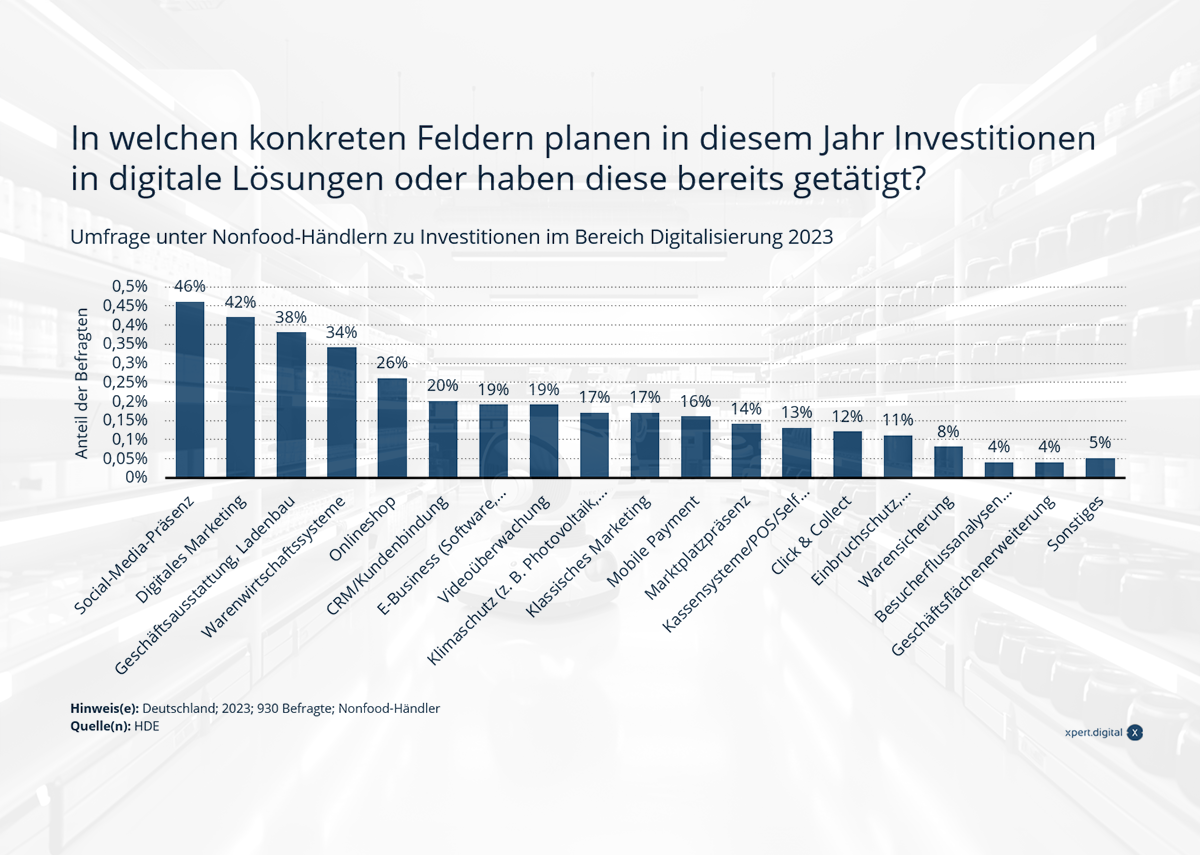🛒 Non-food retailers and digitalization: Limited use of AI so far
🔍 In today's digital world, technological developments are becoming increasingly important. The growing role of artificial intelligence (AI) in various industries and sectors is particularly noteworthy. However, a 2023 survey of non-food retailers revealed that while many companies are investing in digital solutions, the use of AI still plays a subordinate role. It is interesting to note that 95% of German AI startups focus on business-to-business (B2B) solutions and less on generative AI, such as text, image, or video generation, or procedural content creation.
🌐 Digitalization and AI: An Overview
Digitalization encompasses a wide range of technologies and approaches aimed at making business processes more efficient, facilitating access to information, and enabling new business models. AI plays a key role in this, as it is capable of analyzing large volumes of data, recognizing patterns, and making informed decisions. AI technologies are used in many areas, from automating processes and improving the customer experience to optimizing the supply chain.
📊 The current state of affairs in German companies
The survey shows that many companies are ready to invest in digital solutions. Areas such as social media presence, digital marketing, and expanding business infrastructure are particularly important. These investments are crucial for remaining competitive and meeting the demands of modern markets. However, the use of AI in these areas remains relatively limited. This could be because many companies have not yet fully grasped the potential of AI technologies or are uncertain about their application and benefits.
🤝 Focusing on B2B solutions
An interesting aspect of current developments is that 95% of German AI startups are focusing on B2B solutions. These solutions aim to help other companies optimize their processes, reduce costs, and increase efficiency. Examples of such B2B AI solutions include predictive maintenance systems in industry, the use of AI to optimize the supply chain, and the automation of customer service processes. These applications have the potential to deliver significant benefits and boost productivity across various sectors.
🎨 The future of generative AI
While B2B solutions are already widespread, there is still less focus in Germany on generative AI, which deals with the creation of content such as texts, images, and videos. This type of AI has attracted considerable attention in recent years, particularly due to advances in natural language processing and image synthesis. Generative AI can be used in various creative fields, from the automatic generation of texts and content for marketing campaigns to the development of new designs and artwork.
One reason for the lower prevalence of generative AI in Germany could be the complexity of the technology and the associated ethical and legal challenges. Generating content that appears deceptively real to humans raises questions about authorship, data protection, and potential manipulation. It is therefore crucial that companies investing in this area develop clear guidelines and ethical standards.
🌟 Opportunities and challenges
Integrating AI into business processes offers numerous opportunities. It can help automate workflows, create personalized customer experiences, and unlock new business opportunities. AI could play a particularly crucial role in e-commerce, for example, by providing personalized product recommendations or optimizing logistics.
At the same time, there are also challenges that need to be addressed. The use of AI requires expertise and resources that are not available in all companies. Furthermore, there is a risk of job losses due to the automation of tasks. It is therefore important that companies invest not only in the technology itself, but also in the training and professional development of their employees.
🔍 Integrating AI into business processes
Digitalization is progressing relentlessly, and AI plays a central role in this process. While many companies are already investing in digital solutions, the use of AI technologies, particularly in the field of generative AI, still has room for improvement. German AI startups currently focus primarily on B2B solutions aimed at supporting other businesses. It is expected that as awareness of AI's potential grows, its use in creative and generative fields will also increase.
Overall, it is clear that integrating AI into business processes is not just a technological decision, but also a strategic one. Companies that invest in AI early on and integrate it into their business models have the opportunity to secure long-term competitive advantages and succeed in the digital world. It remains to be seen how the market develops and what new innovations in the field of AI can be expected in the coming years.
📣 Similar topics
- 📊 The growing importance of AI in the digital world
- ⚙️ Technology and efficiency: AI in the B2B sector
- 🔍 Non-food retailers and their reluctance to invest in AI
- 📈 German AI startups: B2B in focus
- 🛠️ How AI is revolutionizing the business world
- 🛍️ The use of digital solutions in retail
- 🤖 The future of generative AI in Germany
- 💼 Challenges and opportunities of AI integration
- 🏭 Industry 4.0: AI as a key factor
- 🚀 Digitalization and AI: A guide for companies
#️⃣ Hashtags: #ArtificialIntelligence #Digitalization #B2BSolutions #TechnologyInnovation #GenerativeAI
🎯🎯🎯 Benefit from Xpert.Digital's extensive, five-fold expertise in a comprehensive service package | BD, R&D, XR, PR & Digital Visibility Optimization
Benefit from Xpert.Digital's extensive, fivefold expertise in a comprehensive service package | R&D, XR, PR & Digital Visibility Optimization - Image: Xpert.Digital
Xpert.Digital has in-depth knowledge of various industries. This allows us to develop tailor-made strategies that are tailored precisely to the requirements and challenges of your specific market segment. By continually analyzing market trends and following industry developments, we can act with foresight and offer innovative solutions. Through the combination of experience and knowledge, we generate added value and give our customers a decisive competitive advantage.
More about it here:
🌐💼 The results of a survey show that non-food retailers are increasingly investing in digital transformations
🔍 Survey results show that non-food retailers are increasingly investing in digital transformation to boost their competitiveness and respond to changing customer demands. Key investment areas include:
📱 Social media presence
The largest investment was in social media presence, with 46% of respondents investing in this area. Social media offers retailers a platform to interact directly with their customers, increase brand awareness, and conduct targeted marketing campaigns.
🌐 Digital Marketing
42% of non-food retailers invest in digital marketing. This area includes search engine optimization (SEO), paid online advertising, email marketing, and other digital strategies for customer acquisition and retention.
🏬 Shop equipment and store design
38% of companies are investing in modernizing their physical retail spaces and equipment to improve the shopping experience and adapt to digital standards.
📦 Inventory management systems
34% of retailers rely on modern merchandise management systems that enable more efficient warehousing and inventory control. This is particularly important to support omnichannel retailing, where online and offline channels are seamlessly integrated.
🛒 Online shop
26% of respondents invest in developing or optimizing their online shops. Given the increasing importance of e-commerce, this is a key investment for boosting sales and providing customers with a user-friendly and secure shopping experience.
👫 CRM/Customer Loyalty
Customer Relationship Management (CRM) is another important investment area, with 20% of retailers investing in it. CRM systems help companies manage customer information, conduct personalized marketing campaigns, and increase customer satisfaction.
💻 E-Business (Software, Hardware, Processes)
With a 19% investment, digital business processes represent a key component of digital transformation. Companies are investing in software solutions and hardware to increase the efficiency and flexibility of their business processes.
🎥 Video surveillance
19% of retailers are also investing in video surveillance systems, which not only increase security but can also provide valuable data for customer analysis.
🌞 Climate protection measures (e.g. photovoltaics, charging stations)
17% of companies are relying on environmentally friendly technologies to achieve their sustainability goals while simultaneously reducing operating costs.
🏷️ Classic Marketing
Traditional marketing remains an important area at 17%, although the focus is increasingly shifting towards digital channels.
📈 Increasing importance of e-commerce and digitalization
The survey results reflect the central role that e-commerce and digitalization play in the non-food sector. Integrating digital technologies into the sales process enables companies to increase efficiency, reduce costs, and offer a seamless shopping experience across various channels. This is particularly important at a time when customers are increasingly shopping online and expect a personalized, convenient shopping experience.
🛠️ Challenges and opportunities
While digitalization offers many advantages, retailers also face challenges. One of the biggest challenges is integrating new technologies into existing systems and processes. Many companies are faced with the task of training their employees accordingly and ensuring they can use the new tools effectively.
Another obstacle is financing. Implementing digital technologies can be costly, especially for small and medium-sized enterprises (SMEs). Setting the right priorities and, where appropriate, utilizing government funding programs that support digitalization is crucial.
Nevertheless, digitalization offers numerous opportunities. Companies that successfully invest in digital solutions can not only increase their efficiency but also unlock new business opportunities. For example, analyzing customer data enables targeted communication and better adaptation of offerings to customer needs.
💡 Digital Transformation
For non-food retailers, digitalization is an essential strategy for success in the increasingly digital market. Investments in areas such as social media, digital marketing, e-commerce, and CRM systems demonstrate that the industry has recognized the importance of these technologies and is actively investing in its future. Despite the existing challenges, the opportunities that can arise from a successful digital transformation far outweigh the disadvantages.
📣 Similar topics
- 📣 Social media in focus: 46% of non-food retailers are investing
- 💻 Digital Marketing: The Key to Customer Retention and Acquisition
- 🏬 Modernized retail spaces: 38% focus on shopping experiences
- 📦 Efficient warehousing: Inventory management systems in high demand
- 🛒 Online shops are booming: 26% are investing in their digital storefronts
- 📈 CRM systems: Personalized customer loyalty through technology
- 🔧 E-Business: Processes and digital tools in focus
- 🔍 Video surveillance: Security and data analysis combined
- 🌍 Climate protection in retail: Sustainable technologies on the rise
- 📜 Traditional marketing meets digital transformation
#️⃣ Hashtags: #Digitalization #ECommerce #SocialMedia #CustomerSatisfaction #Sustainability
We are there for you - advice - planning - implementation - project management
☑️ Industry expert, here with his own Xpert.Digital industry hub with over 2,500 specialist articles
I would be happy to serve as your personal advisor.
You can contact me by filling out the contact form below or simply call me on +49 89 89 674 804 (Munich) .
I'm looking forward to our joint project.
Xpert.Digital - Konrad Wolfenstein
Xpert.Digital is a hub for industry with a focus on digitalization, mechanical engineering, logistics/intralogistics and photovoltaics.
With our 360° business development solution, we support well-known companies from new business to after sales.
Market intelligence, smarketing, marketing automation, content development, PR, mail campaigns, personalized social media and lead nurturing are part of our digital tools.
You can find out more at: www.xpert.digital - www.xpert.solar - www.xpert.plus


